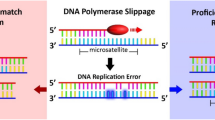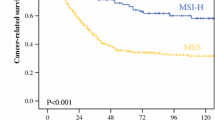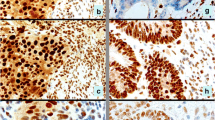Abstract
Objective
The purpose of this study was to determine the unique and universal features of microsatellite instability-high (MSI-H) colorectal cancer (CRC) and MSI-H gastric cancer (GC) in the Chinese population.
Methods
A new panel of mononucleotide MSI markers, BAT25, BAT26, NR21, NR24, and MONO-27, was used to define MSI status in 303 CRC and 288 GC subjects. Clinicopathological features of both types of MSI-H tumors were analyzed. Methylation analysis in the hMLH1 promoter region by methylation specific polymerase chain reaction (PCR) and mutation detection of hMSH2/hMLH1 genes by denaturing high-performance liquid chromatography (DHPLC) were carried out simultaneously.
Results
MSI-H CRCs and MSI-H GCs account for 11.9% and 8.0% of unselected sporadic CRCs and GCs, respectively. MSI-H CRCs are strongly characterized by early onset, right-side location, low differentiation, mucinous tumor, less infiltration, less lymphatic metastasis, and more often familial tumor. MSI-H GCs only showed site preference for the antrum and less lymphatic metastasis. Genetic and epigenetic analyses were positive in 6/36 MSI-H CRCs and 0/23 MSI-H GCs with pathological mutation in major mismatch repair genes, and in 7/36 MSI-H CRCs and 18/23 MSI-H GCs with methylated hMLH1 promoter (P<0.01), respectively.
Conclusions
Although there are many differences in the genetic basis and clinicopathological features between MSI-H CRC and MSI-H GC, when compared with their microsatellite stable (MSS) counterparts, site preference and lymphatic metastasis are features common to both types of MSI-H tumors.
Similar content being viewed by others
References
An, C., Choi, I.S., Yao, J.C., Worah, S., Xie, K., Mansfield, P.F., Ajani, J.A., Rashid, A., Hamilton, S.R., Wu, T.T., 2005. Prognostic significance of CpG island methylator phenotype and microsatellite instability in gastric carcinoma. Clin. Cancer. Res., 11(2):656–663.
Bacher, J.W., Flanagan, L.A., Smalley, R.L., Nassif, N.A., Burgart, L.J., Halberg, R.B., Megid, W.M., Thibodeau, S.N., 2004. Development of a fluorescent multiplex assay for detection of MSI-high tumors. Dis. Markers, 20(4–5): 237–250.
Berginc, G., Glavac, D., 2009. Rapid and accurate approach for screening of microsatellite unstable tumours using quasimonomorphic mononucleotide repeats and denaturating high performance liquid chromatography (DHPLC). Dis. Markers, 26(1):19–26.
Boland, C.R., Thibodeau, S.N., Hamilton, S.R., Sidransky, D., Eshleman, J.R., Burt, R.W., Meltzer, S.J., Rodriguez-Bigas, M.A., Fodde, R., Ranzani, G.N., et al., 1998. A national cancer institute workshop on microsatellite instability for cancer detection and familial predisposition: development of international criteria for the determination of microsatellite instability in colorectal cancer. Cancer Res., 58(22):5248–5257.
Buhard, O., Suraweera, N., Lectard, A., Duval, A., Hamelin, R., 2004. Quasimonomorphic mononucleotide repeats for high-level microsatellite instability analysis. Dis. Markers, 20(4–5):251–257.
de la Chapelle, A., 1999. Testing tumors for microsatellite instability. Eur. J. Hum. Genet., 7(4):407–408. [doi:10.1038/sj.ejhg.5200335]
Deng, G., Chen, A., Hong, J., Chae, H.S., Kim, Y.S., 1999. Methylation of CpG in a small region of the hMLH1 promoter invariably correlates with the absence of gene expression. Cancer Res., 59(9):2029–2033.
Fang, D.C., Wang, R.Q., Yang, S.M., Yang, J.M., Liu, H.F., Peng, G.Y., Xiao, T.L., Luo, Y.H., 2003. Mutation and methylation of hMLH1 in gastric carcinomas with microsatellite instability. World J. Gastroenterol., 9(4):655–659.
Forster, H.P., Emanuel, E., Grady, C., 2001. The 2000 revision of the Declaration of Helsinki: a step forward or more confusion? Lancet, 358(9291):1449–1453. [doi:10.1016/S0140-6736(01)06534-5]
Grady, W.M., 2004. Genomic instability and colon cancer. Cancer Metastasis Rev., 23(1–2):11–27. [doi:10.1023/A:1025861527711]
Gu, M., Kim, D., Bae, Y., Choi, J., Kim, S., Song, S., 2009. Analysis of microsatellite instability, protein expression and methylation status of hMLH1 and hMSH2 genes in gastric carcinomas. Hepatogastroenterology, 56(91–92): 899–904.
Li, F.Y., Lai, M.D., 2009. Colorectal cancer, one entity or three. J. Zhejiang Univ.-Sci. B, 10(3):219–229. [doi:10.1631/jzus.B0820273]
Lim, S.B., Jeong, S.Y., Lee, M.R., Ku, J.L., Shin, Y.K., Kim, W.H., Park, J.G., 2004. Prognostic significance of microsatellite instability in sporadic colorectal cancer. Int. J. Colorectal Dis., 19(6):533–537. [doi:10.1007/s00384-004-0596-2]
Lubbe, S.J., Webb, E.L., Chandler, I.P., Houlston, R.S., 2009. Implications of familial colorectal cancer risk profiles and microsatellite instability status. J. Clin. Oncol., 27(13): 2238–2244. [doi:10.1200/JCO.2008.20.3364]
Ma, Y., Wu, L., Liu, C., Xu, L., Li, D., Li, J.C., 2009. The correlation of genetic instability of PINX1 gene to clinicopathological features of gastric cancer in the Chinese population. J. Cancer Res. Clin. Oncol., 135(3):431–437. [doi:10.1007/s00432-008-0471-6]
Murphy, K.M., Zhang, S., Geiger, T., Hafez, M.J., Bacher, J., Berg, K.D., Eshleman, J.R., 2006. Comparison of the microsatellite instability analysis system and the Bethesda panel for the determination of microsatellite instability in colorectal cancers. J. Mol. Diagn., 8(3): 305–311. [doi:10.2353/jmoldx.2006.050092]
Oda, S., Zhao, Y., Maehara, Y., 2005. Microsatellite instability in gastrointestinal tract cancers: a brief update. Surg. Today, 35(12):1005–1015. [doi:10.1007/s00595-005-3125-1]
Pawlik, T.M., Raut, C.P., Rodriguez-Bigas, M.A., 2004. Colorectal carcinogenesis: MSI-H versus MSI-L. Dis. Markers, 20(4–5):199–206.
Sargent, D.J., Marsoni, S., Monges, G., Thibodeau, S.N., Labianca, R., Hamilton, S.R., French, A.J., Kabat, B., Foster, N.R., Torri, V., et al., 2010. Defective mismatch repair as a predictive marker for lack of efficacy of fluorouracil-based adjuvant therapy in colon cancer. J. Clin. Oncol., 28(20):3219–3226. [doi:10.1200/JCO.2009.27.1825]
Seo, H.M., Chang, Y.S., Joo, S.H., Kim, Y.W., Park, Y.K., Hong, S.W., Lee, S.H., 2009. Clinicopathologic characteristics and outcomes of gastric cancers with the MSI-H phenotype. J. Surg. Oncol., 99(3):143–147. [doi:10.1002/jso.21220]
Suraweera, N., Duval, A., Reperant, M., Vaury, C., Furlan, D., Leroy, K., Seruca, R., Iacopetta, B., Hamelin, R., 2002. Evaluation of tumor microsatellite instability using five quasimonomorphic mononucleotide repeats and pentaplex PCR. Gastroenterology, 123(6):1804–1811. [doi:10.1053/gast.2002.37070]
Theuer, C.P., Campbell, B.S., Peel, D.J., Lin, F., Carpenter, P., Ziogas, A., Butler, J.A., 2002. Microsatellite instability in Japanese vs. European American patients with gastric cancer. Arch. Surg., 137(8):960–965. [doi:10.1001/archsurg.137.8.960]
Umar, A., Boland, C.R., Terdiman, J.P., Syngal, S., Chapelle, A., Rüschoff, J., Fishel, R., Lindor, N.M., Burgart, L.J., Hamelin, R., et al., 2004. Revised Bethesda guidelines for hereditary nonpolyposis colorectal cancer (lynch syndrome) and microsatellite instabilit. J. Natl. Cancer Inst., 96(4):261–268. [doi:10.1093/jnci/djh034]
Vita, F.D., Giuliani, F., Galizia, G., Belli, C., Aurilio, G., Santabarbara, G., Ciardiello, F., Catalano, G., Orditura, M., 2007. Neo-adjuvant and adjuvant chemotherapy of gastric cancer. Ann. Onc., 18(Suppl. 6):120–123.
Xiao, Y.P., Wu, D.Y., Xu, L., Xin, Y., 2006. Loss of heterozygosity and microsatellite instabilities of fragile histidine triad gene in gastric carcinoma. World J. Gastroenterol., 12(23):3766–3769.
Yuan, Y., Huang, Y.Q., Cai, S.R., Song, Y.M., Zheng, S., Zhang, S.Z., 2004. Genetic characterization of Chinese hereditary non-polyposis colorectal cancer by DHPLC and multiplex PCR. Jpn. J. Clin. Oncol., 34(11):660–666. [doi:10.1093/jjco/hyh121]
Author information
Authors and Affiliations
Corresponding author
Additional information
Project (No. R2090353) supported by the Zhejiang Provincial Natural Science Foundation of China
Rights and permissions
About this article
Cite this article
Huang, Yq., Yuan, Y., Ge, Wt. et al. Comparative features of colorectal and gastric cancers with microsatellite instability in Chinese patients. J. Zhejiang Univ. Sci. B 11, 647–653 (2010). https://doi.org/10.1631/jzus.B1000198
Received:
Accepted:
Published:
Issue Date:
DOI: https://doi.org/10.1631/jzus.B1000198




